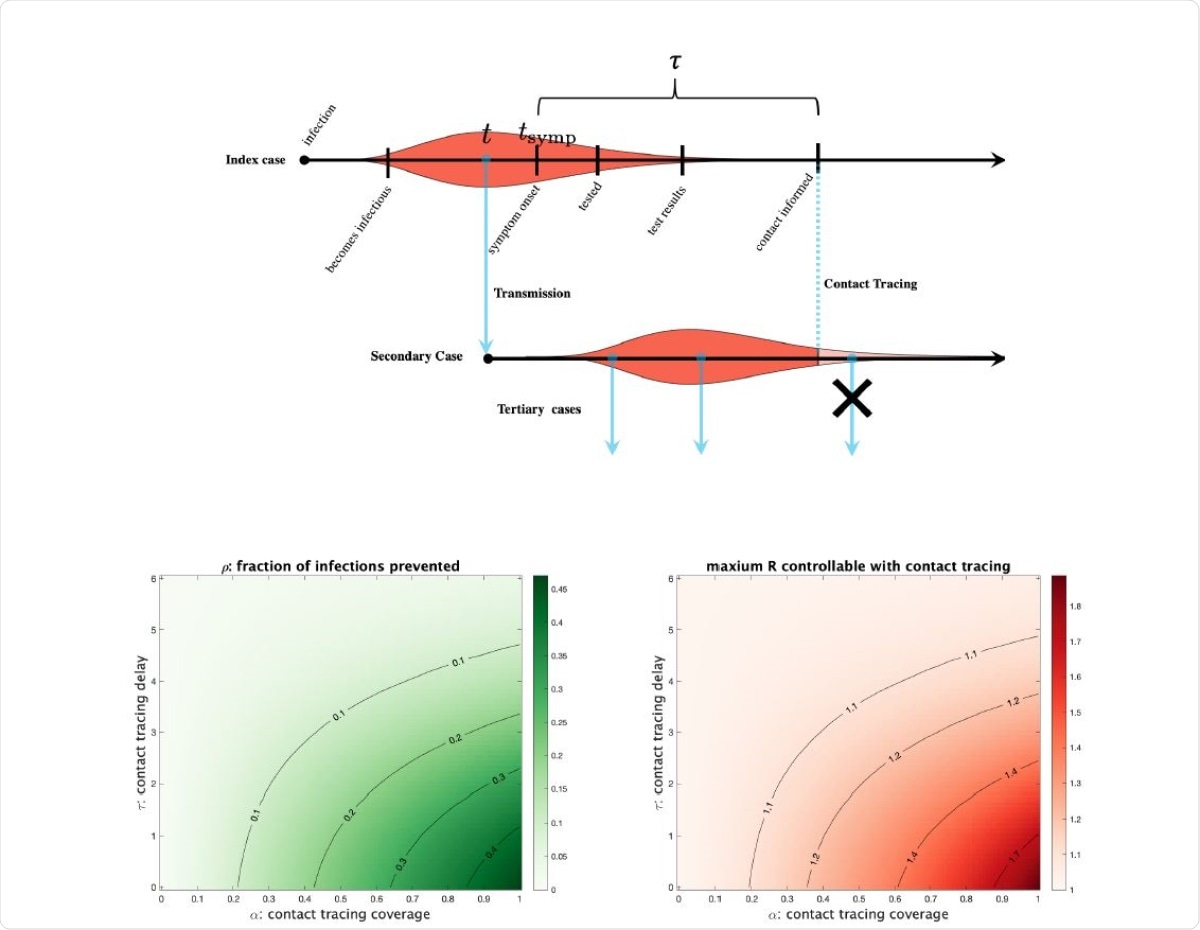Contact tracing has played a pivotal role in efforts to stem the coronavirus disease 2019 (COVID-19), caused by the severe acute respiratory syndrome coronavirus 2 (SARS-CoV-2). Countries that have executed this method well have seen fewer cases and have successfully flattened the curve during successive waves of new cases.
A new study by Canada-based researchers – at Simon Fraser University and the University of British Columbia – showed that contact tracing is not effective if testing and isolation are delayed.

Contact tracing of an index case eliminates infections from a secondary case only after contact and self-isolation occur (blue dashed line).

 This news article was a review of a preliminary scientific report that had not undergone peer-review at the time of publication. Since its initial publication, the scientific report has now been peer reviewed and accepted for publication in a Scientific Journal. Links to the preliminary and peer-reviewed reports are available in the Sources section at the bottom of this article. View Sources
This news article was a review of a preliminary scientific report that had not undergone peer-review at the time of publication. Since its initial publication, the scientific report has now been peer reviewed and accepted for publication in a Scientific Journal. Links to the preliminary and peer-reviewed reports are available in the Sources section at the bottom of this article. View Sources
Contact tracing
Contact tracing is a containment method that lets people know if they might have been exposed to COVID-19. It lets those contacted know that they should monitor their health for signs and symptoms, and distance themselves from vulnerable individuals. It also paves the way for potential contacts of positive patients to get tested and isolate themselves.
The researchers have suggested that contact tracing is ineffective if there are delays in testing, calling, and isolating. Even if the delays are minimized, contact tracing can only prevent a fraction of onward transmissions from contacts.
Timely contact tracing
The report, published in the pre-print journal medRxiv*, highlights the importance of contact tracing in the fight against COVID-19, but emphasizing the importance of timely action.
The timely conduct of contact tracing – to pave the way for testing and isolation – is important to prevent further infections. Several delays in the process make rapid contact tracing challenging for COVID-19 since people are already infectious before their symptoms occur. Also, some people can transmit the virus even if they do not develop symptoms at all.
Social distancing is an effective way to reduce the risk of transmission but has proved to be costly for public health, mental health, and inequality. Lockdown measures, where non-essential travels and businesses were not allowed, have taken a toll on the economy. Thousands of people have lost their jobs, driving national governments to weigh up the feasibility of long-term lockdown measures.
Apart from problems with delayed testing, contact tracing could face overwhelming cases, as SARS-CoV-2 continues to spread rapidly. The researchers noted that the best strategy is to reduce coverage without adding further delays.
“In reality, as the incidence of call volume rises, delays grow. Testing backs up so that fewer onward cases can be prevented,” the researchers wrote in the paper.
“Thus, any event – a burst in transmission caused by a super spreading event, a cluster of importations, or changes in behavior around a holiday, which causes the volume to rise above the limit cannot be reversed by contact tracing alone,” they added.
Winter and holiday season coming
The researchers also noted that since mid-winter is just around the corner, more cases will likely be reported. They recommend that strong distancing measures must be maintained until a vaccine has been widely deployed. Further, governments and health agencies should rethink testing and tracing approaches.
One effective measure is strengthening the power of contact tracing, going beyond merely instructing contacts to isolate, but to test every contract as fast as possible, symptomatic or not. This way, positive patients will be isolated to reduce the spread of the virus.
In contrast, if we simply ask individuals to self-isolate, first this isolation is imperfect, and we do not obtain information about their contacts early enough to prevent onward transmission from them,” the researchers added.
An effective measure to contain the virus spread is mass testing, which has been recently used in Slovakia. In the country, two-thirds have been tested with rapid antigen tests over two days. From there, they identified 57,500 COVID-19 cases, which is about three-quarters of the number of cases detected by polymerase chain reaction (PCR) tests since the beginning of the pandemic.
Though the rapid antigen test is less accurate than the standard PCR test, it is cheaper and so can be deployed much more widely. Another approach is pooled testing, wherein a group of samples is tested simultaneously, with the same amount of resources.

 This news article was a review of a preliminary scientific report that had not undergone peer-review at the time of publication. Since its initial publication, the scientific report has now been peer reviewed and accepted for publication in a Scientific Journal. Links to the preliminary and peer-reviewed reports are available in the Sources section at the bottom of this article. View Sources
This news article was a review of a preliminary scientific report that had not undergone peer-review at the time of publication. Since its initial publication, the scientific report has now been peer reviewed and accepted for publication in a Scientific Journal. Links to the preliminary and peer-reviewed reports are available in the Sources section at the bottom of this article. View Sources
Source:
Journal references: